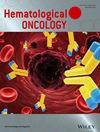Ibrutinib With Bendamustine and Rituximab for Treatment of Patients With Relapsed/Refractory Aggressive B-Cell Lymphoma
Abstract
Therapy for relapsed or refractory (R/R) aggressive B-cell non-Hodgkin lymphoma (aB-NHL) post autologous stem cell transplantation (ASCT) or in elderly patients can be challenging. In this single-center, single-arm, phase II clinical study, we investigated the efficacy of ibrutinib (560 mg once daily) in combination with bendamustine and rituximab (IBR) given for six 28-day cycles in their standard dose, to patients with R/R aB-NHL who were either transplant ineligible in first or second relapse or post-ASCT for second relapse. The primary endpoint was overall response rate (ORR). Fifty-six patients (54% male, median age 69.7 years) were included. ORR was 49.1% among 55 patients treated with ≥ 1 cycle of IBR and 69.4% among 36 patients treated with ≥ 3 cycles. Patients with relapsed disease had significantly higher ORR compared to those with refractory disease (72.3% vs. 37.8%, p = 0.024). Median overall survival (OS) was 11.6 months (95% CI, 7.1–22.3) and median progression-free survival was 5.3 months (95% CI, 2.5–7.4). Patients with complete and partial responses had significantly longer median OS compared to those with stable and progressive disease (28.1 vs. 5.2 months, p < 0.0001). Adverse events included thrombocytopenia (19.6%), anemia (16.1%), neutropenia (7.1%), fatigue (35.7%), diarrhea (28.6%) and nausea (28.6%). At the first efficacy evaluation 8 patients were referred to transplantation, and 3 more were referred during follow-up. These data indicate that the IBR regimen is a safe and effective treatment option that can also be used for bridging to transplantation in patients with R/R aB-NHL.Trial Registration: ClinicalTrials.gov: NCT02747732

 求助内容:
求助内容: 应助结果提醒方式:
应助结果提醒方式:


